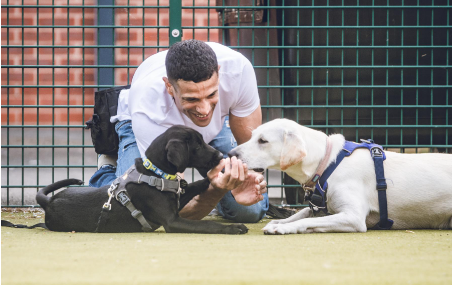Post a Pup Sundays! The Healing Power of Dogs. Post your pup, share stories, memes, photos or videos.
I have spoken about my emotional service dogs. They are as loved as my human children, as essential as oxygen, and understand me in the deepest way that no words can explain. A change in my voice, the speed of my pulse, or a foot tapping lets them know to ground me, touch me, comfort me, or lay on my feet. I have one that goes everywhere, and I mean everywhere I go. If I travel for work, so does my dog. If we go on a holiday, so does my dog. We are symbiotic. He would protect me with his life, and I would do the same. If you have any issues that make life a little painful, or you have social anxiety or PTSD, consider training one for yourself. I go to a specific trainer who knows my issues and trains one for me from a puppy. Mine is a collie/GS mix that can look fierce or friendly. He plays, but only if he can see me but prefers playing with me only. He works hard, so I treat him like a prince with cute collars to match me. I know, I know, don't judge.
This brings me to my article this week:
Paws For Life Prison Program: This program is the first dog rehabilitation program in a men's maximum-security prison. Inmates commit to ten weeks of work and share their lives with dogs from high-kill Los Angeles shelters. Working in collaboration with a trainer, the inmates build dog runs outside their cell block, work in shifts to care for, train, and socialize the animals, and create a bridge to the outside world. All fifteen dogs earned their "Canine Good Citizen" (CGC) certification through the American Kennel Club, and the men were able to introduce the dogs to their new families. Since 2014, Paws For Life has grown exponentially and expanded into three California State Prisons.
Puppies Behind Bars: This program trains incarcerated individuals to raise service dogs for wounded war veterans and first responders, facility dogs for police departments, and explosive detection canines for law enforcement. Puppies enter prison at the age of 8 weeks and live with their incarcerated puppy-raisers for approximately 24 months. As the puppies mature into well-loved, well-behaved dogs, their raisers learn what it means to contribute to society rather than take from it. The program also has dedicated volunteer sitters who support the critical socialization skills the pups need to develop into working dogs.
TAILS program: This program in Florida rehabilitates both inmates and dogs for their release back into society. The program involves a "very strict process" for screening both inmates and dogs. Inmates who have been charged with any violent or animal-related crimes are not eligible, and they also cannot have had any behavioral issues while incarcerated. Even after the dogs graduate, the inmates are permitted to stay in the program and get a new dog "pretty quickly." Each dog is assigned to two inmates, who act as a handler and a trainer. They both spend equal amounts of time with the dog, but the trainer tends to have more experience than the handler.
These programs have been successful in changing the lives of both dogs and inmates. They provide inmates with a sense of purpose and accomplishment, teach them new skills, and help them develop empathy and compassion. They also help dogs that would otherwise be euthanized to find loving homes. The programs also help to reduce recidivism rates among inmates, as they learn new skills and develop empathy and compassion. In addition, the programs benefit society as a whole by providing service dogs for veterans and first responders, facility dogs for police departments, and explosive-detection canines for law enforcement. These programs are a shining example of how we can all make a difference in the world, one dog and one inmate at a time.
Restart Paws is a UK program worth a look at if this subject interests you.






Comments
Post a Comment